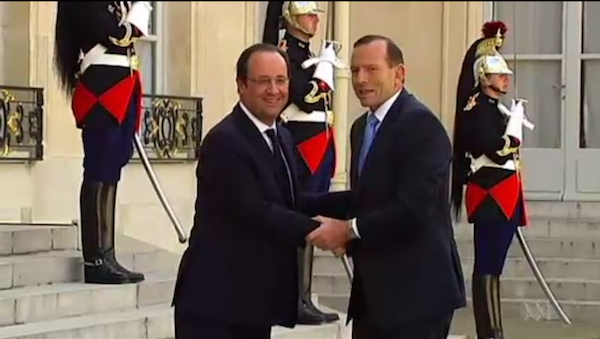In the aftermath of the recent attacks in Sydney and Paris and now the presumed death of another young radicalised Australian, Jake Bilardi, both the French and Australian governments have proposed changes to education and citizenship laws in in the hope of eradicating racial hatred and home-grown radicalisation. Yet while Abbott and Hollande may have similar agendas, the civic values they draw on are promoted as uniquely different – liberal democratic values in Australia and republican values in France.
At the launch of the national security statement just a couple of months after the Martin Place siege, Prime Minister Abbott stated that:
Those who come here must be as open and accepting of their adopted country, as we are of them. Those who live here must be as tolerant of others as we are of them. No one should live in our country while denying our values and rejecting the very idea of a free and open society.
In Australia, there is bipartisan political support for ‘Australian values’. Former Prime Minister John Howard introduced them into legislation in 2007 with the claim that they embodied Australia’s British, Judeo-Christian heritage.
Officially, they focus on the principles of equality, freedom, democracy and the rule of law. In the streets, Australian values are described as mateship and a fair go.
In France, citizens declare their allegiance to republican values. Like Australian values, these were founded during the Enlightenment and in the Universal Declaration of Human Rights and are explicitly expressed in terms of political equality and individual autonomy. Unlike Australia, the promotion of equality underpins France’s support for assimilation.
This is because the French believe that equality means that new French citizens forget their old cultural values, ‘become French’ and are treated the same as everyone else. In France, no distinction or acknowledgement is made regarding a citizen’s origin, race or religion, not even in the national census.
In Australia, talk of assimilation is generally frowned upon as we prefer to speak of our cultural diversity. Somewhat paradoxically, it is the same principle of equality that the French use to assimilate their naturalised citizens that we draw on to claim our success for multiculturalism.
Here, we count all the ethnic and cultural variables of the population and officially support the idea that migrants can maintain their cultural practices ‘within limits’.
Yet a shift in thinking is emerging around the notion of equality. In France, Prime Minister Manuel Valls has acknowledged that France’s poorest citizens are living under a form of ‘racial apartheid’. In Australia, there is ambiguity about how the rhetoric of cultural diversity is played out in real life, especially in relation to respect for religious differences. What is common between France and Australia is that both define themselves as secular nations.
France leads the way in championing secularism. At the press conference in February following the Charlie Hebdo attacks, President Francois Hollande declared himself the protector of republican values and promised to stamp out feelings of segregation among the disaffected youth living in ‘ghetto housing estates’. He called on the French people to re-embrace secularism in order to ensure social cohesion (my translation):
Social cohesion starts with secularism and … it is not negotiable. Secularism represents the values and rules of law that protect what we have in common but also what is unique. Secularism secures France against intolerance.
This month, Hollande is introducing new measures in civic education in order to curb the rise of home-grown terrorists like the Charlie Hebdo gunmen. Teachers will now be trained on how to reinforce republican values in schools in order to shape the ‘civic soul’ of the young.

These measures tap into a debate about France’s national identity that has been raging for over a decade. There has also been controversy around the relationship between French identity and its history. In June 2011, a leaked report drafted under Sarkozy’s government had recommended the promotion of republican values in education, especially in the teaching of French history, as well as new measures to make citizens declare their allegiance to the nation and make naturalised citizens choose one nationality and sit a naturalisation test.
This is nothing new in Australia. In 2005, the Howard government introduced the National Framework for Values Education in Australian Schools and the following year it convened the History Summit in order to reform the high school curriculum on Australian history and emphasise the nation’s historical achievements. In 2007, the government introduced the Australian Values Statement and the Australian citizenship test, a test that required that all aspiring citizens learn about Australian values, Australian history and their civic responsibilities.
Today, the two governments of France and Australia are calling on Imams and Muslim leaders to publicly denounce terrorism and take responsibility for the actions of a few alienated and radicalised individuals simply because they all call themselves Muslim.
Both Hollande and Abbott, too, have vowed to reassure the people that the government is caring for them during these uncertain times. Hollande promised that, as leader of the state, he would give the French people all the advantages and conditions for success. Abbott, too, concluded his national security statement with the promise that ‘there is no greater responsibility – on me – on the government – than keeping you safe’.
The question remains: in this form of national caring, who gets to be included and who is excluded in the name of national values?
Donate To New Matilda
New Matilda is a small, independent media outlet. We survive through reader contributions, and never losing a lawsuit. If you got something from this article, giving something back helps us to continue speaking truth to power. Every little bit counts.



